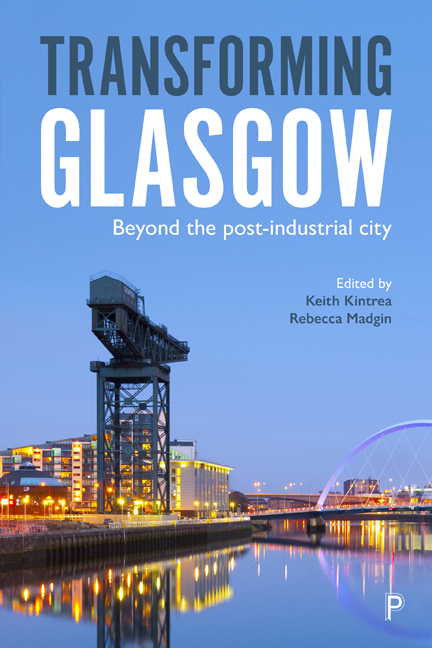Book contents
- Frontmatter
- Contents
- List of Maps, Tables, Figures and Boxes
- Notes on Contributors
- Acknowledgements
- Foreword
- Map
- Introduction: Transforming Post-Industrial Glasgow – Moving Beyond the Epic and the Toxic
- PART I
- PART II
- PART III
- Conclusion: Beyond the Post-Industrial – Narratives of Time and Place
- Index
3 - The New Political Economy of City-Regionalism: Renewed Steps in Glasgow
Published online by Cambridge University Press: 25 March 2021
- Frontmatter
- Contents
- List of Maps, Tables, Figures and Boxes
- Notes on Contributors
- Acknowledgements
- Foreword
- Map
- Introduction: Transforming Post-Industrial Glasgow – Moving Beyond the Epic and the Toxic
- PART I
- PART II
- PART III
- Conclusion: Beyond the Post-Industrial – Narratives of Time and Place
- Index
Summary
Introduction
City-regions are regarded as functional spaces and systems that reflect either a physical built up area or, more typically, boundaries delineated by connections between households and firms (Coombes, 2014; Parr, 2005; 2008). For Rodríguez-Pose (2008, p 1026) ‘interaction between an urban core and its semi-urban and rural hinterland is the essence of the city-region’. From Scott's (2019, p 555) ‘conspectus’ on cityregions, it is suggested that ‘city-regions are cities like any other and there can be no clear line of division that separates them from the rest of urban reality as a whole’. This takes the perspective that city-regions, on the one hand, reflect the clustering of economic activities brought about by ‘gravitational forces’, and, on the other hand, are spread extensively across geographic space with each city-region exhibiting idiosyncratic characteristics. Alternatively, Scott (2019, p 555) points to the ‘size, spatial extent, multipolarity, functional heterogeneity, political influence, innovative capacities, and global interconnectivity’ of cityregions as deserving of special focus as urban spatial arrangements. Storper (2014) in turn speaks of the challenges of governing cityregions given the presence of two dimensions: the ‘urban land nexus’ and ‘principal-agent’ tensions. These reflect, in reduced terms, the spatial organisation of urban socio-economic systems and the evolving, and ultimately incremental policy ‘tinkering’ that emerges in response to change in such systems. Moreover, political contestation is riven through city-regionalism (Jonas and Ward, 2007; Harding, 2007). Indeed, politics, as expressed as the art of the achievable, may contort the shape of city-regional initiatives in somewhat unintuitive ways (Tomaney, 2018). Such general, conceptual perspectives warrant reflection in the Glasgow context where – as this chapter will sketch out – local politics, economic history, core-periphery dynamics and administrative capacities – alongside national policy settings that may seek to balance cross-regional growth and disparities – will fundamentally shape how the city-region agenda will unfold.
The UK is experiencing a shift to city-regionalism (as a sub-national governance response). This is led by developments in England – notably eye-catching arrangements in Greater Manchester (Harding, Harloe and Rees, 2010) – however, city-region arrangements are also emerging in Scotland (Scottish Government, 2011, 2016). Cityregionalism in Glasgow reflects an embryonic process (Pike, 2017), though at stake, given deal-making approaches to policymaking, are claims to be made for future funding and policy levers.
- Type
- Chapter
- Information
- Transforming GlasgowBeyond the Post-Industrial City, pp. 61 - 80Publisher: Bristol University PressPrint publication year: 2019



